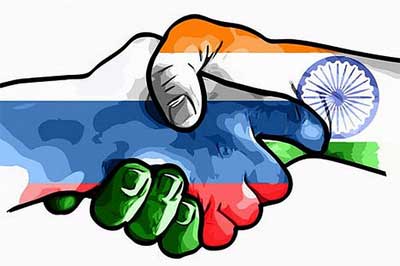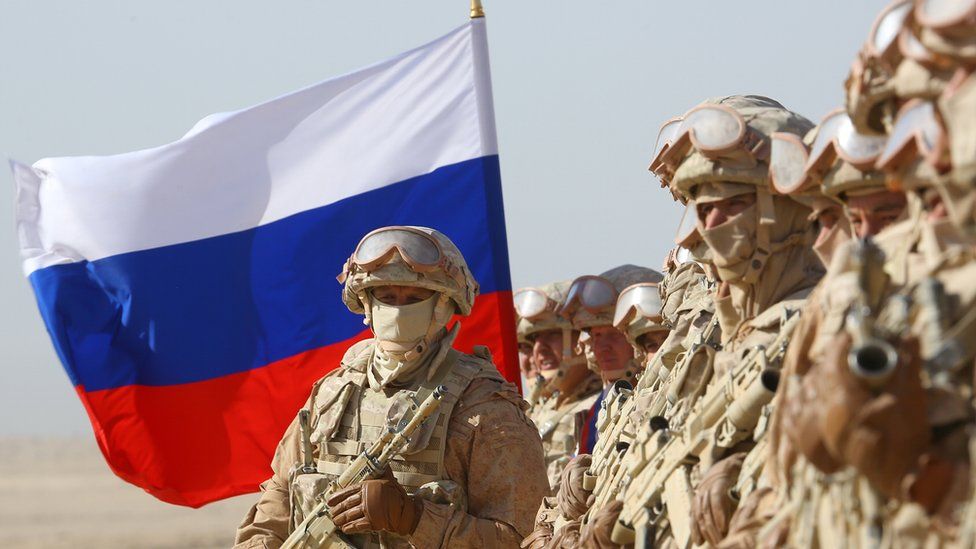
- India’s foreign policy towards Russia has been of sustained continuity, irrespective of the change in Governments and their ideological backgrounds.
- The introduction of 2+2 dialogue between the defence and external affairs counterparts at the ministerial level further strengthens the relationship.
- The Russian support to India has also taken cognizance of the growing hostilities between India and China on the border dispute.
- Russia fears that the USA would encircle it in the Indian Ocean by using its naval assets and would create trouble during a potential conflict. India being the strategic partner of both Russia and the USA has failed to address this issue constructively.
- Russia continues to hold a strong rapport with India despite the institutional paradigm shifts that have taken place over several decades
Russian President Vladimir Putin’s visit to India on 6th December 2021 marked an important milestone of a privileged strategic relationship. Being India’s most reliable and substantive defence partner and a key strategic ally since the days of the Soviet Union, Russia has always embarked upon the principle of deep cultural affinity and a natural friendship that goes beyond the conventional bilateral ties. Russia has consistently backed India on critical issues concerning India’s national interests and national security. However with the reset of the global order and the changing dynamics in the geopolitics, especially in the Asian region, national self-interests and the considerations of National security has affected the growth of the relationship, not in a gloomy manner, but as a clandestine indication of the diversifying interests in the bilateral partners.
India’s foreign policy towards Russia has been of sustained continuity, irrespective of the change in Governments and their ideological backgrounds. It can be presumed from the ongoing debates in the public forums that there is a bipartisan consensus by the government and the opposition parties to sustain and strengthen the ties with Russia in a holistic manner because, despite the rise of China and the emergence of new strategic partnerships with the western powers, the reliability and trust factors with Russia become the leading beacons in constantly institutionalising such a deeply anchored relationship. This also signifies a strong narrative that is built across the political spectrum about the potential of Russian power in the Asia Pacific and the world.
Assessing the strengths and emerging paradigms in the relationship
The extent of the defence ties between India and Russia is well known to everyone, however, there has been a further strengthening of the ties with several MoU’s being signed that not only focus on furthering defence partnerships, but also regenerating the energy sectors of both countries through the supply of critical raw materials that are essential for the production of key national strategic assets. The introduction of 2+2 dialogue between the defence and external affairs counterparts at the ministerial level further strengthens the relationship, by integrating a stable dialogue process to consistently discuss and address the issues of new age warfare, nuclear diplomacy, changing foreign policy and national security dimensions. And most importantly it standardised and institutionalised the process of increasing mutual consultation that is expected in the field of foreign affairs and in defence cooperation.
Despite the perceived apprehensions of possible US sanctions, India has successfully purchased the 5 regiments of S400 Missile Defence Systems worth approximately ₹40000 Crores. As per the recent statement by the foreign secretary, the first batch of delivery has already started. The deals pertaining to the manufacturing and supply of AK 103 and 203 rifles are also being carried out quite remarkably. In a couple of years over 6 lakh, AK 203 rifles worth ₹5000 crores would be manufactured in the factory that is being set up in Amethi. It has to be noted that there is a huge difference between the actual defence collaboration and the public recognition of the defence collaboration between India and Russia. Most of the defence collaboration between India and Russia is sensitive and is classified as the top-secret of National Security by the government. Host of technologies are under discussion and under development, it would not be revealed in the public domain until it reaches an advanced stage where final negotiations and the signing of the contract would start taking place. Joint research, joint production and joint development are the three-dimensional strategy that is being followed by both Nations.
It has to be noted that there is a huge difference between the actual defence collaboration and the public recognition of the defence collaboration between India and Russia.

In fact, it’s well known in the top strategic circles of India, that transfer of technologies in the field of defence is done by Russia exclusively to India and with no other nation. It has major defence partnerships with China, Turkey and several other Central Asian and East European countries, but Russia does not transfer its technology to any of these countries, most importantly to China. In the past few years, due to the efforts of the Indian government, the time frames that were involved in defence deals have been drastically reduced short-circuiting the cumbersome bureaucratic procedures and inordinate delays caused due to lack of decision making at the political level. The gap between the decision being taken and the action time of its implementation has been brought down and made more efficient and effective.
The Russian support to India has also taken cognizance of the growing hostilities between India and China on the border dispute. It has continued the strategic defence partnership with India without any prospective roadblocks and has advocated a dialogue process at both the military and diplomatic levels to peacefully resolve the long-standing issues.
It has not issued any adverse statements on the Repealing of Article 370 in Jammu and Kashmir and has consistently reiterated both at its national level and in the International forums that this is completely an internal issue of India and would not like to cause any adverse interventions. Therefore it has upheld the principle of mutual non-interference in the internal affairs of each other’s countries.
Coming to the Afghanistan issue knows the long-standing implications of a chequered and notorious leadership in Afghanistan guided by the military-industrial complex of Pakistan. It is aware that China too is guided in its policy on Afghanistan by Pakistan. Right from 15 Aug 2021 Russia has maintained its mission in Afghanistan which is important because it is too important an area to leave to third party information. The active engagements during the meeting of NSAs at New Delhi by Russia’s Secretary of the Security Council Nikolai Patrushev, along with the representatives from all Central Asian countries has adequately conveyed the need for India to be at the high table on resolving the volatile situation in Afghanistan. Russia and India should jointly convene more such consultative meetings in which China and Pakistan would incline the commitment to participate and discuss the outstanding contentious issues.
The shortcomings and the prospective slumps in the relationship
One of the key concerns between India and Russia is the stagnation of trade volume between both countries. The economic ties between India and Russia are not as intact as it was in the good old Soviet days where the industrial and agricultural partnerships would prominently capture the limelight. The Far East economic outreach and the promise of 1 billion rupees of investment in the region made by PM Modi have not been fructified and have gone into cold storage mainly because of the massive disruptions caused by the covid-19 pandemic. Though several MoU’s have been signed-in the recent years and even the latest summit, not much progress has been achieved on most of them. Indian and Russian businesses have equally failed to make long term sustainable investments in diversified portfolios in each other’s economics.
Apart from the economic ties, it is important to analyse the emerging limitations of every strategic partnership in the contemporary Times. No country would send its troops and would like to keep the boots on the ground, to support and back up its strategic ally, like it would happen in the cold war era. Apart from the intelligent support, emergency weapon supplies and platforms being offered for diplomatic and political negotiations, allies would not offer a far stretched support to resolve the conflicts between other nations, the expectation being its own national interests. We have to visualise Russia through this evolved strategic prism and understand its limitations vis a vis India. The long-standing adversary of Russia, which is the USA, has been pitching the concept of Indo Pacific for quite some time now and Russia is opposed to the American version of Maritime conception that involves active patrolling in the Indian Ocean region.

It is a good indication that the leadership of both sides have actively and vigorously promoted the bilateral relationship and tried to defy the obstructions levelled by detractors who intend to destabilise the relationship.
Russia fears that the USA would encircle it in the Indian Ocean by using its naval assets and would create trouble during a potential conflict. India being the strategic partner of both Russia and the USA has failed to address this issue constructively. Other than the political reasons a theory of strategic ambiguity is being cited by the national security establishment, wherein remaining disengaged and not taking a clear stand on this issue is being pitched as a brilliant strategy. But the irony is there is a real strategic ambiguity in the Indian establishment and no clear stand is being arrived at despite several efforts made in this regard.
Finally, it is a good indication that the leadership of both sides have actively and vigorously promoted the bilateral relationship and tried to defy the obstructions levelled by detractors who intend to destabilise the relationship. Russia continues to hold a strong rapport with India despite the institutional paradigm shifts that have taken place over several decades, as our foreign secretary Harsh V Shringla said in a recent statement “without the supply of Russian spare parts and defence cooperation our ships won’t sail and our planes won’t fly” this indicates a realist strategic importance of India Russia ties.
This relationship is likely to be one of the most important ones to prospectively attempt for the restoration of the strategic balance of power in the emerging world order. India’s course of even-handed relationships for the promotion of mutual interests with important countries must be further developed. The Indo-Russian relationship must not be fractured because of other emerging strategic relationships. That is the key challenge that needs to be addressed by the strategic community and the policymakers of India.
(The author has a MA in political science and international relations. Views expressed are author’s own)
Viswapramod is a PhD Scholar at the Department of International Studies and Political Science, Christ University, Bangalore. He has an MA in International Relations. Views expressed are the author’s own.
